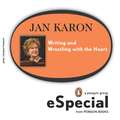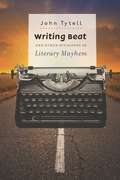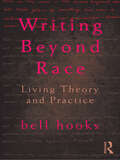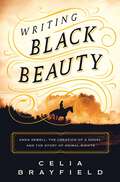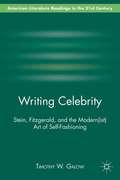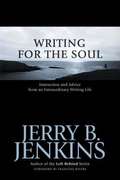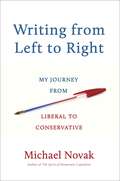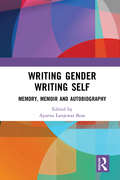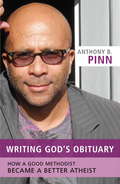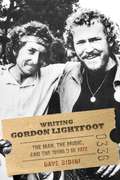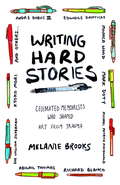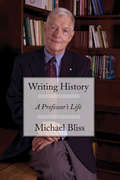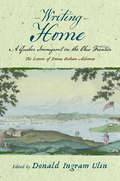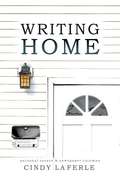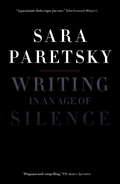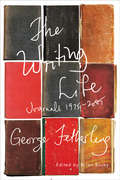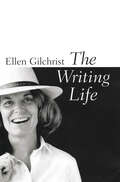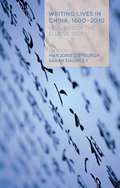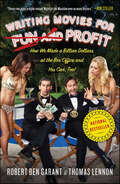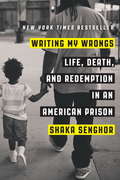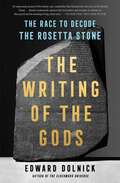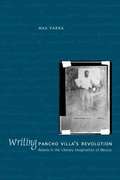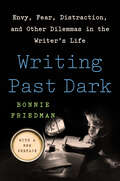- Table View
- List View
Writing and Wrestling with the Heart: Jan Karonfs Washington National Cathedral Lecture
by Jan KaronIn this Penguin eSpecial, Jan Karon, the bestselling author of the Mitford and Father Tim novels, tells the personal story of her life as a writer. Illuminating the way in which faith has influenced both her life and her writing, Karon also discusses her calling as an author--a calling she received early but took years to answer. Only an incredible leap of faith gave her the courage to give up all she had, risking everything to follow this call. Intimate, funny, and straight-from-the-heart, this eSpecial is a superb companion to Jan Karon's novels, providing a revealing glimpse into the life of a novelist who has moved so many people with her words.
Writing Beat and Other Occasions of Literary Mayhem
by John TytellThe story and history of the Beats couldn't be found in the traditional libraries or archives of academic research. For preeminent historian of Beat culture John Tytell, it had to be found in the bars, towns, roads, and hangouts of these writers and figures. And as Writing Beat demonstrates, the same techniques apply to new and future writers.Approaching the history of post-war twentieth century American literature, and in particular the Beat literary movement of Kerouac, Ginsberg, Burroughs, and others, Tytell finds himself uniquely positioned as an eyewitness to many of these stories. In this book, he shares his insight with the reader. As he interviewed, drank, traveled, and survived countless moments with some of these literary legends, Tytell discovered much about the craft of nonfiction, biography, and the nature of history. Writing Beat demonstrates, through Tytell's growth as a professor and historian of the Beats, lessons learned and hazards encountered for those aspiring to become writers themselves.As we approach the sixtieth anniversary of Allen Ginsberg's Howl, Writing Beat reminds us writers do not spring to life fully formed, and the struggle to get to literature can be a blast.
Writing Beat and Other Occasions of Literary Mayhem
by John TytellThe story and history of the Beats couldn't be found in the traditional libraries or archives of academic research. For preeminent historian of Beat culture John Tytell, it had to be found in the bars, towns, roads, and hangouts of these writers and figures. And as Writing Beat demonstrates, the same techniques apply to new and future writers. Approaching the history of postwar twentieth-century American literature, and in particular the Beat literary movement of Kerouac, Ginsberg, Burroughs, and others, Tytell finds himself uniquely positioned as an eyewitness to many of these stories. In this book, he shares his insight with the reader. As he interviewed, drank, traveled, and survived countless moments with some of these literary legends, Tytell discovered much about the craft of nonfiction and biography, and the nature of history. Writing Beat demonstrates, through Tytell's growth as a professor and historian of the Beats, lessons learned and hazards encountered for those aspiring to become writers themselves. As we approach the sixtieth anniversary of Allen Ginsberg's Howl, Writing Beat reminds us writers do not spring to life fully formed, and the struggle to get to literature can be a blast.
Writing Beyond Race: Living Theory and Practice
by bell hooksWhat are the conditions needed for our nation to bridge cultural and racial divides? By "writing beyond race," noted cultural critic bell hooks models the constructive ways scholars, activists, and readers can challenge and change systems of domination. In the spirit of previous classics like Outlaw Culture and Reel to Real, this new collection of compelling essays interrogates contemporary cultural notions of race, gender, and class. From the films Precious and Crash to recent biographies of Malcolm X and Henrietta Lacks, hooks offers provocative insights into the way race is being talked about in this "post-racial" era.
Writing Biography in Greece and Rome:
by De Temmerman, Koen and Demoen, Kristoffel Koen De Temmerman Kristoffel DemoenAncient biography is now a well-established and popular field of study among classicists as well as many scholars of literature and history more generally. In particular biographies offer important insights into the dynamics underlying ancient performance of the self and social behaviour, issues currently of crucial importance in classical studies. They also raise complex issues of narrativity and fictionalization. This volume examines a range of ancient texts which are or purport to be biographical and explores how formal narrative categories such as time, space and character are constructed and how they address (highlight, question, thematize, underscore or problematize) the borderline between historicity and fictionality. In doing so, it makes a major contribution not only to the study of ancient biographical writing but also to broader narratological approaches to ancient texts.
Writing Black Beauty: Anna Sewell, the Creation of a Novel, and the Story of Animal Rights
by Celia BrayfieldThe story of a remarkable woman who wrote a novel that not only became a classic, but also changed the way human society views and treats animals. Born in 1829 to a young Quaker couple, Anna Sewell grew up in poverty in London. She was fourteen when she fell and injured her ankle, which left her permanently disabled. Rejecting the life of a Victorian invalid, she developed an extraordinary empathy with horses, learning to ride side-saddle and to drive a small carriage. Rebellious and independent-minded, Anna suffered periods of severe depression as a young woman. She left the Quaker movement, but remained close friends with the women writers and abolitionists who had been empowered by its liberal principles. It was not until she became terminally ill, aged 51, that she found the courage to write her own book. Tragically, she died just five months after the book was published in 1877. Black Beauty is now recognised as the first anthropomorphic novel, and it had an extraordinary emotional impact on readers of all ages. After modest success in Britain, it was taken up by a charismatic American, George Thorndike Angell, a campaigner against animal cruelty who made it one of the bestselling novels of all time. Using newly discovered archive material, Celia Brayfield shows Anna Sewell developing the extraordinary resilience to overcome her disability, rouse the conscience of Victorian Britain and make her mark upon the world.
Writing Celebrity
by Timothy W. GalowWriting Celebrity is divided into three major sections. The first part traces the rise of a national celebrity culture in the United States and examines the impact that this culture had on "literary" writing in the decades before World War II. The second two sections of the book demonstrate the relevance of celebrity for literary scholarship by re-evaluating the careers of two major American authors, F. Scott Fitzgerald and Gertrude Stein.
Writing for the Soul: Instruction and Advice from an Extraordinary Writing Life
by Jerry B. JenkinsJerry B. Jenkins is the author of the best-selling Left Behind series. This book will appeal to writers as well as fans of Jenkins' writing, as it taps into the growing Christian book industry. From learning the fundamental lessons of the writing world, to breaking in with small (even non-paying markets), Jenkins walks readers through the skills and abilities required to build a writing career. Filled with autobiographical tidbits and lessons he's learned along the way, Jenkins' Writing for the Soul will empower and entertain writers and readers everywhere.
Writing from Left to Right: My Journey from Liberal to Conservative
by Michael Novak"In heavy seas, to stay on course it is indispensable to lean hard left at times, then hard right. The important thing is to have the courage to follow your intellect. Wherever the evidence leads. To the left or to the right." -Michael Novak Engagingly, writing as if to old friends and foes, Michael Novak shows how Providence (not deliberate choice) placed him in the middle of many crucial events of his time: a month in wartime Vietnam, the student riots of the 1960s, the Reagan revolution, the collapse of the Berlin Wall, Bill Clinton's welfare reform, and the struggles for human rights in Iraq and Afghanistan. He also spent fascinating days, sometimes longer, with inspiring leaders like Sargent Shriver, Bobby Kennedy, George McGovern, Jack Kemp, Václav Havel, President Reagan, Lady Thatcher, and Pope John Paul II, who helped shape--and reshape--his political views. Yet through it all, as Novak's sharply etched memoir shows, his focus on helping the poor and defending universal human rights remained constant; he gradually came to see building small businesses and envy-free democracies as the only realistic way to build free societies. Without economic growth from the bottom up, democracies are not stable. Without protections for liberties of conscience and economic creativity, democracies will fail. Free societies need three liberties in one: economic liberty, political liberty, and liberty of spirit. Novak's writing throughout is warm, fast paced, and often very beautiful. His narrative power is memorable.
Writing Gender Writing Self: Memory, Memoir and Autobiography
by Aparna Lanjewar BoseLife Writings/Narratives and studies in gender have been posing critical challenges to fetishizing the manner of canon formations and curriculum propriety. This book engages with these and other challenges turning our customary gaze towards women especially marginal, enabling us to interrogate the established pedagogical practices that accentuates the continuing denial of their agency. Reproduction of the cultural modes of narrativization based on memory and experience becomes a mode of reclaiming the agency. These challenge the homogenising singularity of communitarian notions besides dominant gender constructs using visual, textual, popular, historical, cultural and gender modes enabling one to rethink our received theoretical frameworks. This edited volume brings together 21 essays on life writings produced by both well-established and emerging writers in the field of literature written by scholars from countries like India, Pakistan, China, USA, Iran, Yemen and Australia, to name just a few. Many of the essays in this book focus on how the progress of the self is often impeded by the society it finds itself in. With an enlightening foreword by Dr. E.V. Ramakrishnan and a detailed, critical introduction by Aparna Lanjewar Bose, this anthology is useful for all those who wish to learn more about this genre of writing.
Writing God's Obituary
by Anthony B. PinnA former African American minister reveals his unusual journey from faith to atheism. Anthony Pinn preached his first sermon at age twelve. At eighteen he became one of the youngest ordained ministers in his denomination. He then quickly moved up the ministerial ranks. Eventually he graduated from Columbia University and then received a Master of Divinity in theology and a PhD in religion from Harvard University. All the while, Pinn was wrestling with a growing skepticism. As his intellectual horizons expanded, he became less and less confident in the theism of his upbringing. At the same time, he became aware that his church could offer only anemic responses to the acute social needs of the community. In his mid-twenties, he finally decided to leave the ministry and committed the rest of his life to academia. He went on to become a distinguished scholar of African American humanism and religious history. The once fully committed believer evolved into an equally committed nonbeliever convinced that a secular approach to life offers the best hope of solving humanity's problems.From the Trade Paperback edition.
Writing Gordon Lightfoot: The Man, the Music, and the World in 1972
by Dave BidiniFrom acclaimed musician and author Dave Bidini comes a brilliantly original look at a folk-rock legend and the momentous week in 1972 that culminated in the Mariposa Folk Festival.July, 1972. As musicians across Canada prepare for the nation's biggest folk festival, held on Toronto Island, a series of events unfold that will transform the country politically, psychologically--and musically. As Bidini explores the remarkable week leading up to Mariposa, he also explores the life and times of one of the most enigmatic figures in Canadian music: Gordon Lightfoot, the reigning king of folk at the height of his career. Through a series of letters, Bidini addresses Lightfoot directly, questioning him, imagining his life, and weaving together a fascinating, highly original look at a musician at the top of his game. By the end of the week, the country is on the verge of massive change and the '72 Mariposa folk fest--complete with surprise appearances by Bob Dylan, Neil Young, Joni Mitchell, and yes, Lightfoot--is on its way to becoming legendary.From the Hardcover edition.
Writing Hard Stories: Celebrated Memoirists Who Shaped Art from Trauma
by Melanie BrooksAcclaimed memoirists describe the process of writing their most painful memoriesWriting Hard Stories encourages all writers as they work to craft honest memoirs. Some of the country’s most admired authors describe their own treks through dark memories and breakthrough moments and attest to the healing power of putting words to experience.“Why we endeavor collectively to write a book or paint a canvas or write a symphony...is to understand who we are as human beings, and it’s that shared knowledge that somehow helps us to survive.”—Richard Blanco“Here’s what you need to understand: your brothers [or family or friends] are going to have their own stories to tell. You don’t have to tell the family story. You have to tell your story of being in that family.”—Andre Dubus III“We all need a way to express or make something out of experiences that otherwise have no meaning. If what you want is clarity and meaning, you have to break the secrets over your knee and make something of those ingredients.”—Abigail Thomas“What we remember and how we remember it really tells us how we became who we became.”—Michael Patrick MacDonald“The reason I write memoir is to be able to see the experience itself...I hardly know what I think until I write...Writing is a way to organize your life, give it a frame, give it a structure, so that you can really see what it was that happened.”—Sue William Silverman“After a while in the process, you have some distance and you start thinking of it as a story, not as your story...It was a personal grief, but no longer personal...[It’s] something that has not just happened to me and my family, but something that’s happened in the world.”—Edwidge Danticat“Tibetan Buddhists believe that eloquence is the telling of a truth in such a way that it eases suffering...The more suffering that is eased by your telling of the truth, the more eloquent you are. That’s all you can really hope for—being eloquent in that fashion. All you have to do is respond to your story honestly, and that’s the ideal.”—Kate Bornstein“You can never entirely redeem the experience. You can’t make it not hurt anymore. But you can make it beautiful enough so that there’s something to balance it in the other scale. And if you understand that word beautiful as not necessarily pretty, then you’re getting close to recognizing the integrative power of restoring the balance, which is restoring the truth.”—Richard Hoffman
Writing History: A Professor’s Life
by Michael BlissOne of Canada’s best-known and most-honoured biographers turns to the raw material of his own life in Writing History. A university professor, prolific scholar, public intellectual, and frank critic of the world he has known, Michael Bliss draws on extensive personal diaries to describe a life that has taken him from small-town Ontario in the 1950s to international recognition for his books in Canadian and medical history. His memoir ranges remarkably widely: it encompasses social history, family tragedy, a critical insider’s view of university life, Canadian national politics, and, above all, a rare glimpse into the craftsmanship that goes into the research and writing of history in our time. Whether writing about pigs and millionaires, the discovery of insulin, sleazy Canadian politicians, or the founders of modern medicine and brain surgery, Michael Bliss is noted for the clarity of his prose, the honesty of his opinions, and the breadth of his literary interests.
Writing Home: A Quaker Immigrant on the Ohio Frontier; the Letters of Emma Botham Alderson
by Emma AldersonWriting Home offers readers a firsthand account of the life of Emma Alderson, an otherwise unexceptional English immigrant on the Ohio frontier in mid-nineteenth-century America, who documented the five years preceding her death with astonishing detail and insight. Her convictions as a Quaker offer unique perspectives on racism, slavery, and abolition; the impending war with Mexico; presidential elections; various religious and utopian movements; and the practices of everyday life in a young country. Introductions and notes situate the letters in relation to their critical, biographical, literary, and historical contexts. Editor Donald Ulin discusses the relationship between Alderson’s letters and her sister Mary Howitt’s Our Cousins in Ohio (1849), a remarkable instance of transatlantic literary collaboration. Writing Home offers an unparalleled opportunity for studying immigrant correspondence due to Alderson’s unusually well-documented literary and religious affiliations. The notes and introductions provide background on nearly all the places, individuals, and events mentioned in the letters. Published by Bucknell University Press. Distributed worldwide by Rutgers University Press.
Writing Home: Collected Essays and Newspaper Columns from 1992 - 2004
by Cindy La FerleBoth a memoir and a handbook for living, Writing Home brings together 12 years of domestic essays and columns by the journalist author.
Writing in an Age of Silence
by Sara ParetskyA revealing look at the power of speaking out, Writing in an Age of Silence describes Paretski's coming of age in a time of great possibility, during the civil rights movement, the peace movement, and the women's movement. Bestselling crime-writer Sarah Paretsky has won critical acclaim for her V.I. Warshawski novels, centered around one of the first and most popular female investigators in contemporary fiction. In this fascinating and personal account, Paretsky describes a life shaped by the desire to act. From the feminist movement--which triggered her aspirations to write and shaped the character of her female detective--to the Patriot Act and the liberties we have lost, Paretsky describes the struggle of one individual to find a voice. A moving call to action, Writing in an Age of Silence chronicles the social changes that have shaped contemporary America, and mirrors a desire for freedom, both personal and political, that many Americans will relate to today.
The Writing Life
by George Fetherling Brian BusbySelected from thousands of pages of the daily journals of George Fetherling - the inexhaustible novelist, poet, and cultural commentator - The Writing Life reveals an astute and candid observer of his contemporaries as well as himself. Hundreds of figures in the arts and public life crisscross the pages of Fetherling's journals, from Margaret Atwood and Marshall McLuhan, to Gwendolyn MacEwen and Conrad Black. The book begins in mid-1970s Toronto, a time of cultural ferment, and carries on to Vancouver and a new century. A captivating and intimate narrative, The Writing Life provides a compelling portrait of the last three decades of Canadian cultural life. From the book: Tuesday 4 February 1992 / Toronto Early this morning the latest in a series of strange phone calls from Edmund Carpenter in New York to discuss successive versions of his Canadian Notes & Queries piece on Marshall McLuhan. He falls to reminiscing and at one point says: "Marshall always reminded me of that passage in Boswell in which Boswell says that if you chanced to take shelter from a rain storm for a few minutes in Dr Johnson's company, you would come away convinced that you had just met the smartest man in the world. Marshall was like that too. Of course, if you spent an hour with Marshall, well, that was something quite different."
The Writing Life
by Ellen GilchristCelebrated author Ellen Gilchrist played many roles—writer and speaker, wife and lover, mother and grandmother. But she had never tackled the role of teacher.Offered the opportunity to teach creative writing at the University of Arkansas, she accepted the challenge and ventured into unknown territory. In the process of teaching more than two hundred students since her first class in 2000, she found inspiration in their lives and ambitions and in the challenge of conveying to them the lessons she had learned from living and writing. The Writing Life brings together fifty essays and vignettes centered on the transforming magic of literature and the teaching and writing of it. A portion of the collection discusses the delicate balance between an artistic life and family commitments, especially the daily pressures and frequent compromises faced by a young mother. Gilchrist next focuses on the process of writing itself with essays ranging from “How I Wrote a Book of Short Stories in Three Months” to “Why Is Rewriting So Hard?” Several essays discuss her appreciation of other writers, from Shakespeare to Larry McMurtry, and the lessons she learned from them. Eudora Welty made an indelible impact on Gilchrist’s work. When Gilchrist takes on the task of teaching, her essays reveal an enriched understanding of the role writing plays in any life devoted to the craft. Humorous and insightful, she assesses her own abilities as an instructor and confronts the challenge of inspiring students to attain the discipline and courage to pursue the sullen art. Some of these pieces have been previously published in magazines, but most are unpublished, and all appear here in book form for the first time.
Writing Lives in China, 1600-2010
by Marjorie Dryburgh Sarah DaunceyThis innovative collection explores the life stories of Chinese women and men between the seventeenth and twenty-first centuries. It draws on both biographical and autobiographical narratives and on perspectives taken from life writing theory to ask how lives were lived and written within and against the rules of the auto/biographical game.
Writing Movies for Fun and Profit: How We Made a Billion Dollars at the Box Office and You Can, Too!
by Robert Ben Garant Thomas LennonThis isthe only screenwriting guide by two guys who have actually done it (instead of some schmuck who just gives lectures about screenwriting at the airport Marriott); “These guys are proof that with no training and little education, ANYONE can make it as a screenwriter” (Paul Rudd).Robert Ben Garant and Thomas Lennon’s movies have made over a billion dollars at the box office—and now they show you how to do it yourself! This book is full of secret insider information about how to conquer the Hollywood studio system: how to write, pitch, structure, and get drunk with the best of them. Well…maybe not the best of them, but certainly the most successful. (If you’re aiming to win an Oscar, this is not the book for you!) But if you can type a little, and can read and speak English—then you too can start turning your words into stacks of money!This is the only screenwriting book you will ever need (because all other ones pretty much suck). In these pages, Garant and Lennon provide the kind of priceless tips you won’t find anywhere else, including:-The art of pitching -Getting your foot in the door -Taking notes from movie stars -How to get fired and rehired -How to get credit and royalties!And most important: what to buy with the huge piles of money you’re going to make!Writing Movies for Fun and Profit will take you through the highs and lows of life as a professional screenwriter. From the highs of hugging Gisele Bündchen and getting kung fu punched by Jackie Chan to the soul-crushing lows of Herbie: Fully Loaded.Read this book and you’ll have everything you need to make your first billion the old-fashioned way—by “selling out” in show business!A portion of the authors’ proceeds from this book are being contributed to the USO of Metropolitan Washington, a private, nonprofit organization dedicated to serving active duty military members and their families in the greater Washington, DC, region.
Writing My Wrongs
by Shaka SenghorIn 1991, Shaka Senghor was sent to prison for second-degree murder. Today, he is a lecturer at universities, a leading voice on criminal justice reform, and an inspiration to thousands.In life, it's not how you start that matters. It's how you finish. Shaka Senghor was raised in a middle class neighborhood on Detroit's east side during the height of the 1980s crack epidemic. An honor roll student and a natural leader, he dreamed of becoming a doctor--but at age 11, his parents' marriage began to unravel, and the beatings from his mother worsened, sending him on a downward spiral that saw him run away from home, turn to drug dealing to survive, and end up in prison for murder at the age of 19, fuming with anger and despair. Writing My Wrongs is the story of what came next. During his nineteen-year incarceration, seven of which were spent in solitary confinement, Senghor discovered literature, meditation, self-examination, and the kindness of others--tools he used to confront the demons of his past, forgive the people who hurt him, and begin atoning for the wrongs he had committed. Upon his release at age thirty-eight, Senghor became an activist and mentor to young men and women facing circumstances like his. His work in the community and the courage to share his story led him to fellowships at the MIT Media Lab and the Kellogg Foundation and invitations to speak at events like TED and the Aspen Ideas Festival.In equal turns, Writing My Wrongs is a page-turning portrait of life in the shadow of poverty, violence, and fear; an unforgettable story of redemption, reminding us that our worst deeds don't define us; and a compelling witness to our country's need for rethinking its approach to crime, prison, and the men and women sent there.From the Hardcover edition.
The Writing of the Gods: The Race to Decode the Rosetta Stone
by Edward DolnickThe surprising and compelling story of two rival geniuses in an all-out race to decode one of the world&’s most famous documents—the Rosetta Stone—and their twenty-year-long battle to solve the mystery of ancient Egypt&’s hieroglyphs.The Rosetta Stone is one of the most famous objects in the world, attracting millions of visitors to the British museum ever year, and yet most people don&’t really know what it is. Discovered in a pile of rubble in 1799, this slab of stone proved to be the key to unlocking a lost language that baffled scholars for centuries. Carved in ancient Egypt, the Rosetta Stone carried the same message in different languages—in Greek using Greek letters, and in Egyptian using picture-writing called hieroglyphs. Until its discovery, no one in the world knew how to read the hieroglyphs that covered every temple and text and statue in Egypt. Dominating the world for thirty centuries, ancient Egypt was the mightiest empire the world had ever known, yet everything about it—the pyramids, mummies, the Sphinx—was shrouded in mystery. Whoever was able to decipher the Rosetta Stone, and learn how to read hieroglyphs, would solve that mystery and fling open a door that had been locked for two thousand years. Two brilliant rivals set out to win that prize. One was English, the other French, at a time when England and France were enemies and the world&’s two great superpowers. The Writing of the Gods chronicles this high-stakes intellectual race in which the winner would win glory for both himself and his nation. A riveting portrait of empires both ancient and modern, this is an unparalleled look at the culture and history of ancient Egypt and a fascinating, fast-paced story of human folly and discovery unlike any other.
Writing Pancho Villa's Revolution: Rebels in the Literary Imagination of Mexico
by Parra MaxThe 1910 Mexican Revolution saw Francisco "Pancho" Villa grow from social bandit to famed revolutionary leader. <P>Although his rise to national prominence was short-lived, he and his followers (the villistas) inspired deep feelings of pride and power amongst the rural poor. After the Revolution (and Villa's ultimate defeat and death), the new ruling elite, resentful of his enormous popularity, marginalized and discounted him and his followers as uncivilized savages. Hence, it was in the realm of culture rather than politics that his true legacy would be debated and shaped.<P>Mexican literature following the Revolution created an enduring image of Villa and his followers. Writing Pancho Villa's Revolution focuses on the novels, chronicles, and testimonials written from 1925 to 1940 that narrated Villa's grassroots insurgency and celebrated—or condemned—his charismatic leadership. By focusing on works by urban writers Mariano Azuela (Los de abajo) and Martín Luis Guzmán (El águila y la serpiente), as well as works closer to the violent tradition of northern Mexican frontier life by Nellie Campobello (Cartucho), Celia Herrera (Villa ante la historia), and Rafael F. Muñoz (¡Vámonos con Pancho Villa!), this book examines the alternative views of the revolution and of the villistas. Max Parra studies how these works articulate different and at times competing views about class and the cultural "otherness" of the rebellious masses. This unique revisionist study of the villista novel also offers a deeper look into the process of how a nation's collective identity is formed.
Writing Past Dark: Envy, Fear, Distraction and Other Dilemmas in the Writer's Life
by Bonnie FriedmanWriting Past Dark charts the emotional side of the writer's life. It is a writing companion to reach for when you feel lost and want to regain access to the memories, images, and the ideas inside you that are the fuel of strong writing. Combining personal narrative and other writers' experiences, Friedman explores a whole array of emotions and dilemmas writers face—envy, distraction, guilt, and writer's block—and shares the clues that can set you free. Supportive, intimate, and reflective, Writing Past Dark is a comfort and resource for all writers.
